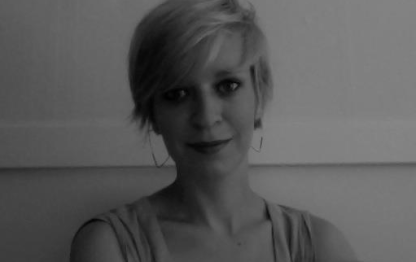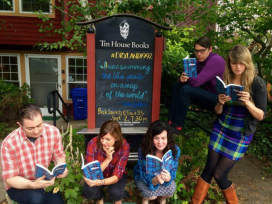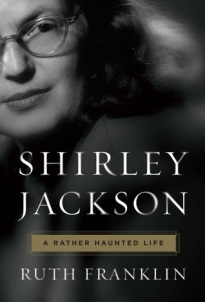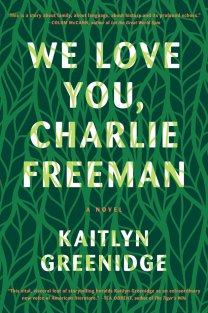
Today’s interview is with Masie Cochran, Editor at Tin House Books, an independent publisher based in Portland, Oregon. As well as publishing books Tin House also publishes a renowned quarterly magazine and run summer and winter writing schools.

Claire: Hello Masie. Can you tell me a bit more about Tin House and the kinds of books that make it onto the company’s list?
Masie: I love working at Tin House. It’s a wonderful combination of a small house with a big reach. We publish about 18 titles a year, so each book gets a lot of detailed attention. All of the editors, everyone in publicity and marketing, and everyone in the art department reads every title. Pub day is a family affair. The collaboration still amazes me—when Dryland was published we all wore plaid. We tromped around in the  misty woods up from the Tin House, taking pictures of Our Endless Numbered Days amongst the old growth pines, ferns and mushrooms. We’ve all read hundreds (and hundreds!) of
misty woods up from the Tin House, taking pictures of Our Endless Numbered Days amongst the old growth pines, ferns and mushrooms. We’ve all read hundreds (and hundreds!) of
flash fiction stories for our various Plotto contests. Our publicist Sabrina Wise, purchased a rabbit cake pan (with plans to make a vegan cake) for the launch of Rabbit Cake.
Win McCormack’s [Publisher and Editor-in-Chief] vision for the books arm of Tin House has continued and expanded on the tradition of the magazine: seek out new voices and continue to champion established, prize-winning authors. Win places a great deal of trust in his staff—he’s open to our tastes and not afraid to take chances. I think this is what makes our list compelling—each season brings new firsts.
Claire: What do you get the most satisfaction from in your job?
I really love the process before publication—pretty much all of it. When I first read a manuscript it lives so much in my imagination. It might be the closest feeling I can get to the feeling the author has when they create. It’s so new, so few have read it—full of possibility and promise.
I remember when I finished your first book, Our Endless Numbered Days. It was a Saturday and because I wasn’t in the office, I felt a little stuck. I had this intense urge to talk to somebody; your ending had unsettled me in the best of ways.
I knew I wanted to offer on your novel, but more than anything I wanted to skip all of the  nervous, finger-crossing stuff and WORK on your book. I was that inspired. I called up Nanci McCloskey—our Director of Sales and Marketing—at 9:00 in the morning from Whole Foods. Turns out, she’d finished it the night before too and was up, ready to talk.
nervous, finger-crossing stuff and WORK on your book. I was that inspired. I called up Nanci McCloskey—our Director of Sales and Marketing—at 9:00 in the morning from Whole Foods. Turns out, she’d finished it the night before too and was up, ready to talk.
So, I’d say the most satisfying part of my job is all of the details—the solitary editing process, the author phone calls, the editorial back and forth, and the work done with publicity and marketing before publication.
It’s real work with a definite goal. We want to get our author’s books in the hands of as many readers as possible and we want to challenge those readers with the work we publish. And, of course, it’s extra-satisfying and affirming when that work goes on to meet (or exceed) our expectations.
Claire: Before you worked at Tin House, you were at Inkwell Management – a literary agency. Why the jump? And was it an easy transition from agent to editor?
Masie: I left InkWell in 2008, right before the market crash. I didn’t leave because I wasn’t happy—InkWell is an amazing office and I’m friends with many of the agents there. I call Michael Carlisle [Founding Partner] my literary Godfather (he started that, I think), because he introduced me to the whole world. I was waitressing in upstate New York where I was lucky enough to wait on a wonderful writer named Leslie Daniels. She put me in touch with Michael and I got on a bus for the 5 hour trip to meet him in New York City. On 5th Avenue! I was raised in a small town in Arkansas, so my first trip to New York City was like a trip to the moon. It was that otherworldly and unmooring. I’d never seen (or really imagined) anything like it. I called my mom and told her that the office was on the 26th floor! I’d never been so high.
After interning for Michael, I got a job as Richard Pine’s [Founding Partner] assistant. Simply put, Richard changed the way I read. Richard is a demanding boss—in the best sense of the word—he demands your opinion and point-of-view (and also that you get to work early!). I tried, in many ways, to model myself after him. And though I never got to the office before him (I tried), I took pages home with me like he did and tried to dedicate myself to our authors and their work in the same full-force way.
More than anything, Richard taught me to trust my taste, but not to be blinded by it. I began reading, not just for myself, but also with others in mind. I learned how to see promise and not dismiss work because of bias. I very consciously changed the way I approached the work. I started thinking about how I might make the story better and how to bring it to a wider audience. I began holding a pen while I read and started to trust and feel strongly about the marks I made. Working for Richard brought the editor out in me and after that I wasn’t really able to let go of the books we worked on. I wanted to continue working on them and to—well—edit them.
Claire: How do you find the majority of manuscripts you personally accept? How many manuscripts do you read and pass on, compared to those you accept? And is it very much a personal choice, or do they need to fit into Tin House’s style of publishing?
Masie: The vast majority of the manuscripts I buy, I buy from agents. Sara Jaffe, Kevin Sampsell, and Noley Reid did not have agents so it’s not unheard of, but because we only have three editors on staff we are unable to read most unsolicited manuscripts. So, about 99% of what I see comes from agents and even from that curated pool, I still only buy about six books a year (with an eye to do more!). That might sound depressing to some aspiring authors, and as a numbers game it’s not very good. But, the upside is that once you’ve found a home, especially with a small publisher—you get a lot of attention.
At first I’m sure the reason I’m drawn to a book is personal. I have loved all the books I’ve worked on. I’m a sucker for voice and story, but you probably know that already. Within only a few pages of Our Endless Numbered Days, I felt I knew Peggy. You worked the same magic with Swimming Lessons. Also, both open with a mystery…I’m a sucker for that too.
After I’ve decided that I like something, I have the fun task of convincing everyone that I work with and for. I have to be more objective about the book that I’ve recently fallen in love with and must have. I think about comp titles, the market, ‘‘ways in’’. Then, if there’s a consensus—I make an offer.
Claire: What do you like best about working with authors and what do you wish they’d do differently?
Masie: I really like working with authors (what else can I say?). No, really, I do. I think I learn a lot about the editing process in the back and forth. I might think that I have the best idea to solve a character problem or a lull in action, only to find that the author has come up with something even better.
But I guess, if I were made of magic, I’d have authors worry a bit less about “the reader” during the writing process and about reviewers after the book is done.
Claire: How much time do you have to read for pleasure, and what books have you read this year that you’ve loved?
Masie: I try to read as much outside of work as I can. I think it keeps my perspective healthy. I also try to read something unlike what I am currently working on. So, for example, if I’m deep in the edits of a memoir, you’ll probably find only novels on my  nightstand. I read Shirley Jackson: A Rather Haunted Life while working on Swimming Lessons.
nightstand. I read Shirley Jackson: A Rather Haunted Life while working on Swimming Lessons.
Claire: That’s interesting. I really want to read that biography. In fact I’ve been dropping hints to my husband about a Christmas present…
Masie: I thought Tin House had a stellar list in 2016 and I could pick almost any title, but I don’t want to play in-house favorites. I haven’t been able to shake Dana Spiotta’s Innocents and Others and I loved Kaitlyn Greenidge’s We Love You, Charlie Freeman.
Claire: Can you tell me something that you think readers of this interview series would find surprising about your job?
Masie: People often ask me if I write and I don’t. Then they ask me if I want to write—and I don’t. Maybe they think if you are surrounded by wonderful books all day that you are drawn to write a book all your own. So far, for me, the opposite has happened. I’m so impressed and full of wonder by the books I get to work on that it’s made the idea of writing even more mysterious to me. I love editing books—especially deep and detailed editorial work—but sitting down to a blank page is still unknowable to me.
Claire: Thanks so much Masie, for letting us into your working life and telling us about your world of books.
*
Read my interview with a reader in a literary agency
Read my interview with a literary agent
Read my interview with a Publishing Director at Fig Tree / Penguin
Read my interview with an Art Director at Tin House
Read my interview with a Foreign Rights Agent in a literary agency
Read my interview with a Translator
*

My second novel, Swimming Lessons, will be published in January 2017 in the UK, and Canada, and February 2017 in the USA. Click on the country links to pre-order.
Great interview. It is nice to read about the behind-the-scenes. I loved reading the part where Masie says “it was on the 26th floor” and her journey in the literary world
LikeLiked by 1 person
I know! Her excitement really comes across.
LikeLiked by 1 person
Such an interesting series of posts, Claire. And Shirley Jackson popping up again – I really must read her in 2017.
LikeLiked by 2 people
I know! How odd is that. And you must.
LikeLiked by 1 person
I think Penguin are reissuing something something by her in January which should kick me into action.
LikeLiked by 1 person
On my radar too!
Another great post Clare
LikeLiked by 1 person
Pingback: Publishing Interviews: The Translator | Claire Fuller
Pingback: Publishing Interviews: The Agency Reader | Claire Fuller
Pingback: Publishing Interviews: The Literary Agent | Claire Fuller
Pingback: Publishing Interviews: The Publishing Director | Claire Fuller
Pingback: Publishing Interviews: The Art Director | Claire Fuller
Pingback: Publishing Interviews: The Foreign Rights Agent | Claire Fuller
Pingback: Publishing Interviews: Head of Sales | Claire Fuller
Pingback: Publishing Interviews: The Copy-editor | Claire Fuller
Pingback: Publishing Interviews: The Publicist | Claire Fuller